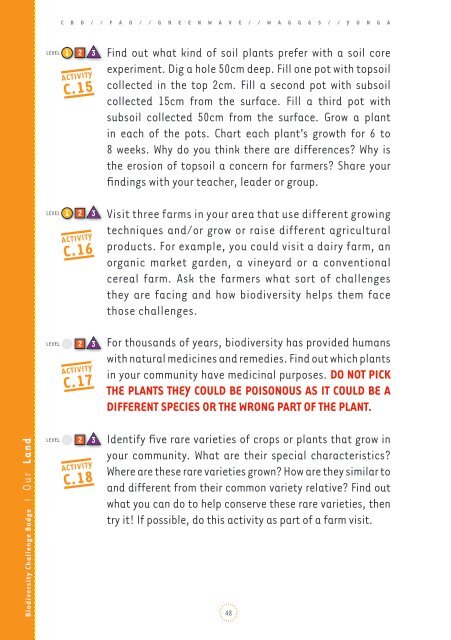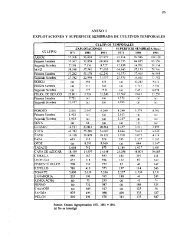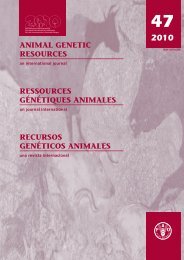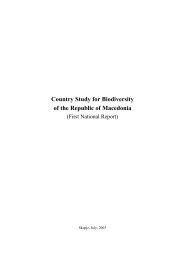Biodiversity Challenge Badge - Convention on Biological Diversity
Biodiversity Challenge Badge - Convention on Biological Diversity
Biodiversity Challenge Badge - Convention on Biological Diversity
Create successful ePaper yourself
Turn your PDF publications into a flip-book with our unique Google optimized e-Paper software.
<str<strong>on</strong>g>Biodiversity</str<strong>on</strong>g> <str<strong>on</strong>g>Challenge</str<strong>on</strong>g> <str<strong>on</strong>g>Badge</str<strong>on</strong>g> | our land<br />
C B d / / f a o / / g r e e n W a v e / / W a g g g s / / y u n g a<br />
leVel 1 2 3<br />
aCtivity<br />
C.15<br />
leVel 1 2 3<br />
aCtivity<br />
C.16<br />
leVel 2 3<br />
aCtivity<br />
C.17<br />
leVel 2 3<br />
aCtivity<br />
C.18<br />
Find out what kind of soil plants prefer with a soil core<br />
experiment. dig a hole 50cm deep. Fill <strong>on</strong>e pot with topsoil<br />
collected in the top 2cm. Fill a sec<strong>on</strong>d pot with subsoil<br />
collected 15cm from the surface. Fill a third pot with<br />
subsoil collected 50cm from the surface. grow a plant<br />
in each of the pots. chart each plant’s growth for 6 to<br />
8 weeks. why do you think there are differences? why is<br />
the erosi<strong>on</strong> of topsoil a c<strong>on</strong>cern for farmers? share your<br />
findings with your teacher, leader or group.<br />
Visit three farms in your area that use different growing<br />
techniques and/or grow or raise different agricultural<br />
products. For example, you could visit a dairy farm, an<br />
organic market garden, a vineyard or a c<strong>on</strong>venti<strong>on</strong>al<br />
cereal farm. ask the farmers what sort of challenges<br />
they are facing and how biodiversity helps them face<br />
those challenges.<br />
For thousands of years, biodiversity has provided humans<br />
with natural medicines and remedies. Find out which plants<br />
in your community have medicinal purposes. do not piCk<br />
the plants they Could Be pois<strong>on</strong>ous as it Could Be a<br />
different speCies or the Wr<strong>on</strong>g part of the plant.<br />
identify five rare varieties of crops or plants that grow in<br />
your community. what are their special characteristics?<br />
where are these rare varieties grown? how are they similar to<br />
and different from their comm<strong>on</strong> variety relative? Find out<br />
what you can do to help c<strong>on</strong>serve these rare varieties, then<br />
try it! if possible, do this activity as part of a farm visit.<br />
48

















